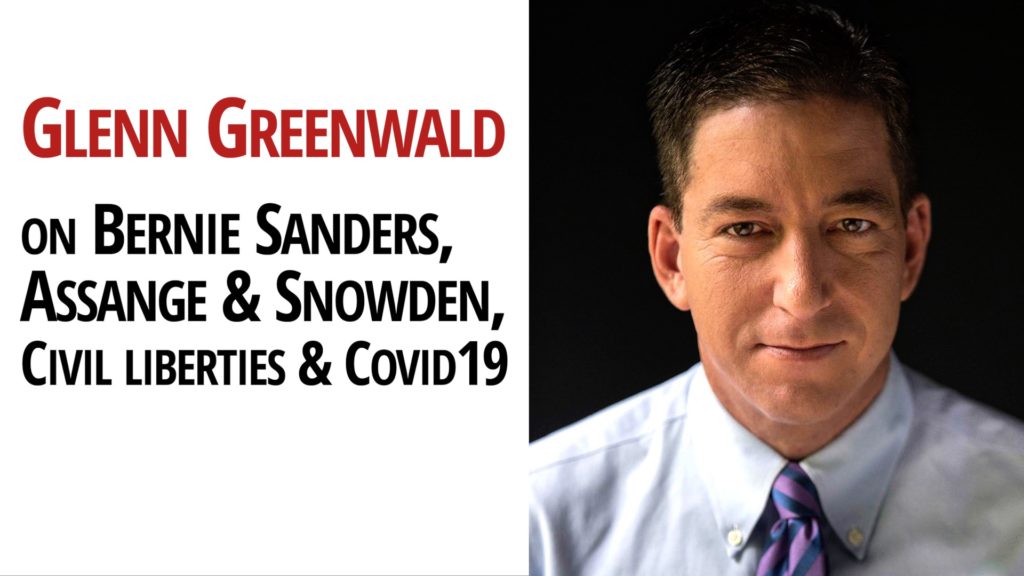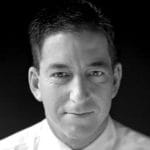
Glenn Greenwald on Voting for the Lesser Evil, Sanders, Assange & Civil Liberties during COVID19
In this exclusive interview with investigative journalist, constitutional lawyer and the co-founder of The Intercept Glenn Greenwald, we discuss the general political atmosphere in Brazil during the COVID-19 crisis and the state of the country’s healthcare system. In addition, we assess the “Secret Brazil Archive series” that Greenwald exposed through The Intercept and why the Bolsonaro government decided to prosecute him. Furthermore, we examine the significance of the Julian Assange case and why some liberals and environmentalists are not inclined to support him. We touch on U.S. politics including the internal and external reasons for Bernie Sanders’ failure and how to approach voting for the lesser of two evils this election cycle. Lastly we provide an update on Edward Snowden’s condition in Russia and conclude the interview with a discussion on universal basic income.
To read the transcript of this video: Glenn Greenwald on Voting for the Lesser Evil, Sanders, Assange & Civil Liberties during COVID19
https://youtu.be/cs75CkIxSHA
To watch more of our videos on this topic or with other experts such as Edward Snowden, Noam Chomsky, Abby Martin, Yanis Varoufakis, Jeremy Scahill, Jill Stein, Daniel Ellsberg, etc, please visit and subscribe to our YouTube channel by clicking here.
Click here or on the picture below:
 Glenn Greenwald is a former constitutional lawyer, a Pulitzer-Prize winning journalist, and the author of several bestsellers, including With Liberty and Justice for Some (2011) and No Place to Hide: Edward Snowden, the NSA, and the U.S. Surveillance State (2014). Acclaimed as one of the 25 most influential political commentators by The Atlantic, one of America’s top 10 opinion writers by Newsweek, and one of the Top 100 Global Thinkers for 2013 by Foreign Policy, Greenwald is a former constitutional and civil rights litigator.
Glenn Greenwald is a former constitutional lawyer, a Pulitzer-Prize winning journalist, and the author of several bestsellers, including With Liberty and Justice for Some (2011) and No Place to Hide: Edward Snowden, the NSA, and the U.S. Surveillance State (2014). Acclaimed as one of the 25 most influential political commentators by The Atlantic, one of America’s top 10 opinion writers by Newsweek, and one of the Top 100 Global Thinkers for 2013 by Foreign Policy, Greenwald is a former constitutional and civil rights litigator.
He was a columnist for The Guardian until October 2013 and is now a founding editor of the media outlet, The Intercept. He has won numerous awards for his NSA reporting, including the 2013 Polk Award for national security reporting, the top 2013 investigative journalism award from the Online News Association, the Esso Award for Excellence in Reporting (the Brazilian equivalent of the Pulitzer Prize), and the 2013 Pioneer Award from Electronic Frontier Foundation. He also received the first annual I. F. Stone Award for Independent Journalism in 2009 and a 2010 Online Journalism Award for his investigative work on the arrest and detention of Chelsea Manning. In 2013, Greenwald led the Guardian reporting that was awarded the Pulitzer Prize for public service, and his work was featured in the 2014 film Citizenfour, which won the Academy Award for Best Documentary.
Glenn Greenwald Picture Credit for YouTube, Website Featured Image & Facebook: Jimmy Chalk
1 Antwort auf „Glenn Greenwald on Voting for the Lesser Evil, Sanders, Assange & Civil Liberties during COVID19“
After listening to the first minute or so of the abovementioned interview, I could just nor bear it any longer.
SARS-COV-2 is indeed behaving like an aggressive type of flu, ok, not a mild one. But that is it. It is NOT a pandemic. The one ignoring science here is not Bolsonaro, but Greenwald. I know what I am talking about because I am a scientist, I am holding a PhD. My main topic is medicine statistics at the moment.
Correlations between infections and deaths of countries with and without lockdown are strong, showing that lockdowns have no positive effect. Evidence is amassing that the effect of lockdowns is actually negative. Isolating old and sick people is the right thing to do. Bolsonaro is absolutely right. It is working for Iceland, Belarus and Sweden. South Korea also never had a lockdown. Ok, they had mobile phone tracking, but that is unethical.
The health care system has to be sufficiently prepared, then natural immunization is most probably the best that can be done. Of course, to be sure, we would need antibody or serological testing. Prof. Ioannidis is just doing that in California, let us hope that others will follow.
In Iceland, which never had a lockdown, the case fatality rate is at 0.5 %. One has to bear in mind, though, that this was researched without serological testing. A big proportion of the population might already be immune or going through an infection unnoticed. In fact the estimated failure is at 0.3 %, so the case fatality rate will lie between 0.2 and 0.8 %, most probably lower, in a country without lockdown and only very mild social distancing rules.
You can calculate that yourself using the data from worldometers, btw., and if you like. In fact, that would be journalism instead of letting a LAWYER, not a medical doctor or statistician, define what is unscientific.